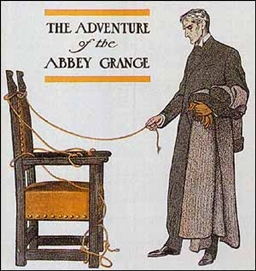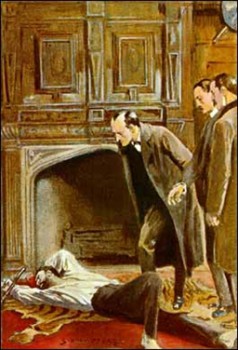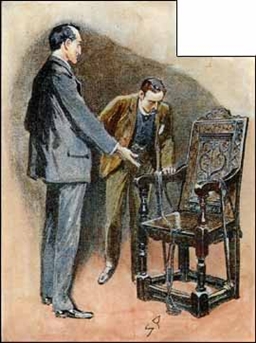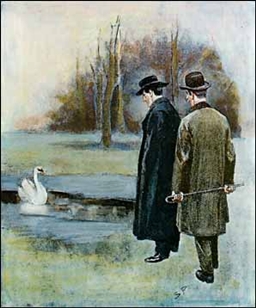The Public Life of Sherlock Holmes: Was Holmes Fooled in The Abbey Grange?
 I wrote about Playing the Game in a prior post about “Charles Augustus Milverton.” I much prefer this kind of Holmes speculation to the currently trendy erotic fan fiction that BBC Sherlock seems to have inspired in frightening amounts. As Holmes himself said, “unmitigated bleat!”
I wrote about Playing the Game in a prior post about “Charles Augustus Milverton.” I much prefer this kind of Holmes speculation to the currently trendy erotic fan fiction that BBC Sherlock seems to have inspired in frightening amounts. As Holmes himself said, “unmitigated bleat!”
WARNING – THIS ENTIRE POST IS A SPOILER. If you haven’t read “The Abbey Grange,” click here and do so before continuing on.
In “The Five Orange Pips,” Holmes says “I have been beaten four times – three times by men, and once by a woman.” Might not “The Adventure of the Abbey Grange” provide us the opportunity to add one to that count?
The facts as Holmes accepts them in this case: Sir Eustace Brackenstall is presented as an abusive husband when drinking. Lady Brackenstall (real name, Mary Fraser) had met First Officer Jack Croker on a voyage from her native Australia to England.
He fell in love with her, but received only friendship for her part. Mary met Sir Eustace, was courted and married the wealthy baronet. Croker later learned from Mary’s maid, Theresa Wright, that Eustace treated his love poorly.
 Croker familiarized himself with the household and knocked on the study French door one cold night. Mary let him in. Sir Eustace entered the room in a rage, insulting his wife and striking her in the face with a stick. He turned on Croker, who defended himself with a fireplace poker and killed Brackenstall. Croker, Mary, and Theresa conspired to make the affair look like a burglary, which fooled the police, but not Holmes.
Croker familiarized himself with the household and knocked on the study French door one cold night. Mary let him in. Sir Eustace entered the room in a rage, insulting his wife and striking her in the face with a stick. He turned on Croker, who defended himself with a fireplace poker and killed Brackenstall. Croker, Mary, and Theresa conspired to make the affair look like a burglary, which fooled the police, but not Holmes.
Holmes gives Croker a chance to flee ahead of the police, but the man refuses to abandon his love. It had been a test by Holmes, which Croker passed. Holmes provides no more assistance to Stanley Hopkins and leaves Croker to do his best to remain a free man and attempt to build a future with Fraser.
Was Holmes duped? Could not the “facts” be looked at with different motives, leading to an alternate conclusion? What reader, familiar with today’s television dramas (or even the Columbo episodes of the nineteen seventies), doesn’t envision a different story?
Suppose that Mary and Croker had an affair on the ship? Casual sex was certainly frowned upon in Victorian England, but neither was married or engaged, so there was no scandalous adultery. However, they continued with the affair, even as Mary pledged her affections to Sir Eustace Brackenstall.
How many romantic assignations did they have? Did Mary’s attitude towards her husband turn colder? Like Jim Browner before him in “The Cardboard Box,” did Sir Eustace increase his drinking, the state of his marriage further deteriorating?
Then, Sir Eustace saw the unmistakable signs of infidelity. Cheating women could certainly be indiscreet. Charles Augustus Milverton made his living off them. Finally, Sir Eustace, suspecting that the man who was cuckolding his wife was in his very house, rushed into the study to confront the lovers.
 Naturally, he first turned his attention towards his wife, the very woman he provided for and in return was betrayed. This gave Croker the opportunity to grab the fire place poker and strike down Sir Eustace. The two lovers were stunned at what they had done and turned to the nearby wine to steady their nerves. Theresa Wright entered the room and ever loyal to her mistress, threw in her lot with the pair.
Naturally, he first turned his attention towards his wife, the very woman he provided for and in return was betrayed. This gave Croker the opportunity to grab the fire place poker and strike down Sir Eustace. The two lovers were stunned at what they had done and turned to the nearby wine to steady their nerves. Theresa Wright entered the room and ever loyal to her mistress, threw in her lot with the pair.
Events then transpired as Holmes believed. That is one scenario. There is a similar, but more cunning, version of events as well.
Croker and Mary are lovers, as postulated above. The affair continued even after she married Sir Eustace. However, they feel constricted by the need for secrecy and resent their time apart. Mary, now Lady Brackenstall, is likely the principal heir to the significant Brackenstall fortune.
Only Sir Eustace’s annoying habit of being alive stands in the way of their being together and also being very rich. The divorce laws of the day are no help.
If they can kill Sir Eustace and make it appear that it was an accident, or completely shift the blame away from Mary, their happiness would be assured (keep in mind, nobody except Theresa Wright knows about Croker at this point). Croker is presently residing in Sidenham and learns of a gang that recently committed a robbery there.
The gang makes a perfect scapegoat. One evening, Mary secretly lets Croker into the house. She calls out to her husband, who enters the room. Croker smashes him in the head, killing Sir Eustace. Again, from this point on, events proceed as Holmes believes they did, Theresa planting the dead man’s cudgel on him the only notable variation. Holmes even tells Croker that he should wait a year and then pursue Mary Fraser’s affections. He falls right into their plan!
In both of these scenarios, Sir Eustace can either be a blackguard or an adequate husband (Hopkins’s description of the man seems to preclude him being an above average man): it matters not. The lovers want him dead so that they can be together and his fitness as a husband is irrelevant.
 These scenarios are plausible and only conflict with the story as presented in that they assume Croker, Mary, and Theresa lied. Well, Holmes assumed that himself, so that isn’t such a stretch.
These scenarios are plausible and only conflict with the story as presented in that they assume Croker, Mary, and Theresa lied. Well, Holmes assumed that himself, so that isn’t such a stretch.
Fact: Lady Brackenstall secretly let a man into her home late at night;
Fact: That man was in love with her;
Fact: That man was willing to sacrifice his own life for her;
Fact: Lady Brackenstall was unhappy with her marriage (by her own admission);
Fact: Lady Brackenstall knew that the law offered her no escape or redress.
Supposition: It is more likely that she let the man in as part of a plot against her husband than it is for Sir Eustace to have somehow discovered their presence and gotten himself killed while confronting them.
Watson waxed eloquently about the former Mary Fraser:
Lady Brackenstall was no ordinary person. Seldom have I seen so graceful a figure, so womanly a presence and so beautiful a face.
Holmes and Watson decreed themselves a two-man judge and jury and found Croker not guilty. Were they fooled by a woman with a beautiful face and likely at least a modicum of cunning?
Nolo contendere.
You can read Bob Byrne’s ‘The Public Life of Sherlock Holmes’ column here at Black Gate every Monday morning.
He founded www.SolarPons.com, the only website dedicated to the ‘Sherlock Holmes of Praed Street’ and blogs about Holmes and other mystery matters at Almost Holmes.
Er, actually, among the upper class, adultery winked at when fornication was not. Presuming the woman had carefully produced the heir and the spare, she could join her husband in discrete infidelity.
Outside of marriage was right out. That that baby was illegitimate would be too obvious.
As you say, Bob, both scenarios are plausible, but both require Holmes to be fooled, and not by a genius like Irene Adler or Moriarty, but by ordinary people. That leaves a bad taste in my mouth, so I’m going to assume all passed as he deduced it.
Thanks!